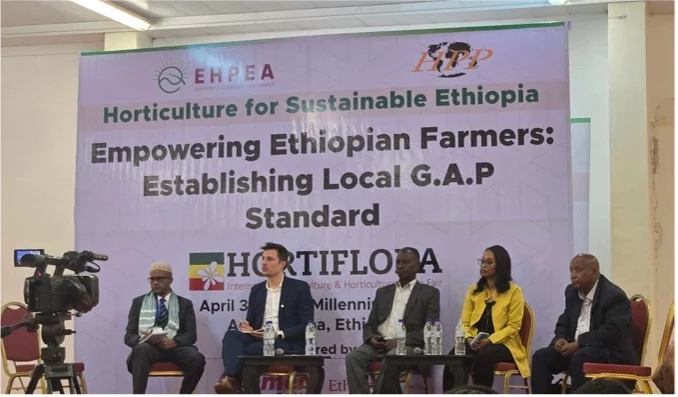
Local G.A.P. Standards: A New Era for Ethiopian Agriculture Unveiled at HortiFlora Expo
April 4, 2025

On 3 April 2025, the last day of the 9th HortiFlora Expo in Addis Ababa, EHPEA, in collaboration with CASA, organized a knowledge-sharing session titled “Empowering Ethiopian Farmers by Establishing Local Good Agricultural Practices (G.A.P.) Standard.” This session aimed to highlight the importance of establishing a Local G.A.P. Standard in Ethiopia to empower local farmers.
Dr. Nina Hissen, Climate, Environment, and Agriculture Advisor at FCDO Ethiopia (photo), delivered the opening remarks, emphasizing the significance of having a G.A.P. Standard. She stated, “Localizing G.A.P. Standard is important as it ensures consumer safety, improves access to the global market, and promotes climate resilience, resulting in sustainability.”
Following the opening remarks, a panel discussion on Local G.A.P. Standard was conducted. The panelists (see photo below) clarified the concept of Local G.A.P., discussed various models for implementing the G.A.P. Standard in the Ethiopian context, identified the challenges in establishing these standards, and explored how Local G.A.P. can enhance the quality of agricultural products. Additionally, the discussion raised awareness among various stakeholders, including farmers, the private sector, experts, and policymakers, about the importance of Local G.A.P., examined the obstacles in its implementation, and outlined the steps needed to move forward. By engaging experts and stakeholders, the panel fostered collaboration, shared insights, and developed strategies to promote sustainable agricultural practices that benefit both farmers and consumers.

During the discussion, it was explained that implementing Local G.A.P. Standard helps to improve the quality of agricultural practices at production and post-harvest stages, increase market access, ensure food safety, strengthen the supply chain, boost farmers’ incomes and sustainability, and facilitate certification to the Global G.A.P. Standard.
Major challenges identified during the discussion included a lack of awareness among producers and other actors in the agriculture value chain about the importance of adhering to G.A.P. Standard, loose enforcement of G.A.P. Standard by regulatory bodies, the absence of certification requirements at a national level, and costs related to certification.
It was stated that continuous capacity building and awareness-raising efforts, the application of different models, and contextualizing the process are crucial for the smooth and full implementation of Local G.A.P. Standards. Additionally, continuous capacity building of various actors in the agriculture value chain was highlighted as essential.

By the end of the discussion, participants emphasized the need to ensure food safety, increase market access for Ethiopian farmers by providing support for G.A.P. Standard certification, and improve law enforcement by regulatory bodies for the proper implementation of Local G.A.P. in the country. To achieve this, participants agreed on the need to establish a steering committee composed of producers, consumers (represented by the Hotel Association), government bodies (including policymakers, research institutions, legislative bodies, and standards authority), and EHPEA to push the implementation of Local G.A.P. Standard forward.